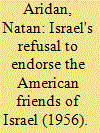|
|
|
Sort Order |
|
|
|
Items / Page
|
|
|
|
|
|
|
| Srl | Item |
| 1 |
ID:
100751


|
|
|
|
|
| Publication |
2010.
|
| Summary/Abstract |
The aim in presenting and analyzing the document below on Israel's refusal to endorse the proposed AFI, the American Friends of Israel, in March 1956, which it considered a threat to existing pro-Israel advocacy activities, is not only a fascinating account of the origins of Israel's ambivalence regarding garnering support for its case on Capitol Hill, but also serves as an interesting parallel to the current controversy relating to Israel's policy toward the recently established radical alternative lobby for Israel, J Street. 2
J Street invited Ambassador Michael Oren to address its first Washington conference; however, after an extended delay Oren declined. 3 The embassy issued a statement saying that it would be "privately communicating its concerns over certain policies of the organization that may impair the interests of Israel". J Street leader Jeremy Ben-Ami did not "understand how it is in the State of Israel's interest to look at J Street as a problem, to write off an organization that represents a large number of American Jews."
It should come as no surprise that Oren balked at attending their recent annual conference. Since its inception, the MFA (Ministry of Foreign Affairs) has refused to endorse pro-Israel organizations it has deemed either ineffective or unwilling to be "instructed" by Israel's diplomatic representatives. Although AIPAC (American Israel Public Affairs Committee) 4 was established and financed by American citizens, by sanctioning AIPAC's monopoly Israel has consistently aimed to diminish the competition, thus ensuring that the source, gathering, and dissemination of information would be controlled by Israel.
Israel's foreign relations have been directed by the MFA and its diplomatic representatives who inevitably supplanted the Zionist organizations that had for more than thirty years regarded themselves as the official
|
|
|
|
|
|
|
|
|
|
|
|
|
|
|
|
| 2 |
ID:
169986


|
|
|
|
|
| Summary/Abstract |
This article focuses on the immediate repercussions of a reconstituted Jewish State after “2,000 years” on its relations with Diaspora Jewry and its diplomatic relations epitomized by American and Anglo Jewry. The Jewish Agency and Zionist organizations, once effective and indispensable former “retailers” were inexorably and painfully usurped by the new “wholesaler”, the Government of Israel and its diplomats who now appealed directly to all willing to contribute to strengthening Israel, irrespective of their past or present affiliations with the Zionist movement. Israeli diplomats viewed the Zionist organizations as the board of a company, which had been nationalized, had much goodwill, an immense pool of experience, some capital, but no clear idea about what to do with themselves. The path to reach a modus vivendi on delegating and authorizing responsibilities on public relations and Israel advocacy was acrimonious.
|
|
|
|
|
|
|
|
|
|
|
|
|
|
|
|
|
|
|
|
|